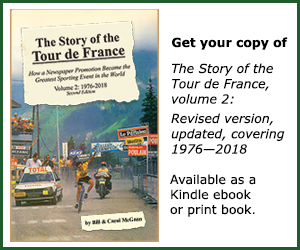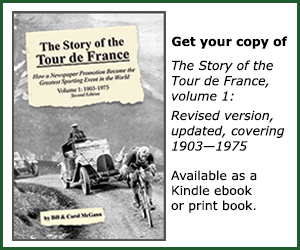
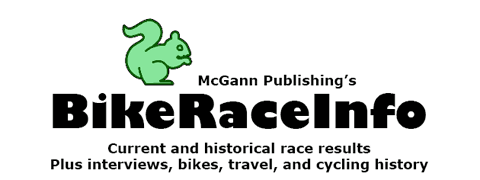
Lunch with Dutch Pro Jac van Meer
Professional Cycling Explained
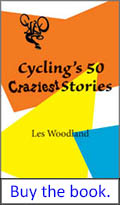
Les Woodland's book Cycling's 50 Craziest Stories is available as an audiobook here. For the print and Kindle eBook versions, just click on the Amazon link on the right.
Our story:
While we were in Belgium to see the 2011 Gent 6-Day, writer Les Woodland suggested we have lunch with a friend of his, ex-pro cyclist and retired bicycle distributor Jac van Meer.
After a successful amateur career, van Meer was a pro from 1981 to 1986, riding on teams with Sean Kelly and later Freddy Maertens.
This interview is different from the others I’ve conducted. Usually I’m well prepared with pages of questions that result in a very structured talk. This time, van Meer kindly let me turn on the recorder while we had lunch and he told the story of his time as a cycling professional.
You’d like Jac van Meer. He's bright and charming and fills a room with his cheerful personality. The stories follow, one after another, like that Greek wine vase that never empties, and he tells them well.
One is left with the impression that team politics denied van Meer the career his talent merited. Except for one year, he wasn't allowed to compete on the stage of the big tours where he was really at home.
After retiring from professional cycling, for years van Meer was a successful bicycle distributor, being the Dutch agent for Pinarello.
Bill McGann: You were national champion?
Jac van Meer: Of Holland.
BM: Champion of Holland...in what year?
JvM: In 1980.
BM: And what year did you turn pro?
JvM: I started as a pro in '81. When I was second in the Championship of Holland in '78, I had enjoyed a good year as an amateur. We had a very good national coach of Holland, Rini Wagtmans [excellent pro rider of the late '60s], and he promised me, if I was in good shape, that I could ride the Olympics. So I waited for the Olympics in '80.
BM: Did you ride them?
JvM: Yes.
BM: The '80 Olympics were in Moscow?
JvM: In Moscow, yes.
BM: Which Sukhoruchenkov won?
JvM: Yes Sukhoruchenkov with Czesław Lang [who came second], who was a Polish rider and there was another Russian rider [Yury Barinov]. There were three who were gone. They were like mopeds, so fast, like mopeds they rode, they were unbelievable. [Van Meer finished 33rd out of 112 starters, just behind Olaf Ludwig and ahead of Régis Clere and Stephen Roche]
BM: That was the year the United States didn't go because of Jimmy Carter?
JvM: Yes, because there was something in Afghanistan...already then, Afghanistan...
BM: So you turned pro in 1981?
JvM: Yes, for a Dutch Team, HB Alarm Systems.
BM: And the next year?
JvM: That was a small team, and I thought there might be a place for me on TI-Raleigh, Peter Post’s team, which was at that time, famous.
Les Woodland: I tried to get you a place on the TI-Raleigh team. I spoke to Ruud Bakker...
JvM: Ruud Bakker, he was a famous soigneur...
Les Woodland: And he said, "perhaps", but he didn’t think you were strong enough. I said I have this very good friend, because he knew who you were...
JvM: But later, years and years and years later, I heard the real story of why I was not taken in by the Raleigh team. It was because the team manager from Gazelle, Ben Van Erp had a fight with Peter Post [legendary TI-Raleigh team manager]. Peter Post had already asked me to come to TI Raleigh in 1978. And then Van Erp said, "No, he will not go to TI-Raleigh!"
BM: Because at the time you were riding for Gazelle? [which was a gastrennersvereniging, a sponsored amateur team of riders drawn from different clubs. An amateur pro team in a way]
JvM: I was riding for Gazelle and the team manager said I was too young. I was just 18.
BM: Which is kind of young...
JvM: It was '78, I was 20. He said I was too young, but he did not say this to me. Years later I heard the story because later I asked Post why I wasn’t on his team and Post told me what happened.
BM: Because the Gazelle manager blocked you?
JvM: I still remember the place very well where Peter Post told me this. It was when Gerrie Knetemann, who died far too young [former World Champion Knetemann died of a heart attack at 53, while riding his bike]...there were six people carrying his coffin...I was one of them. I was the only pall bearer who hadn’t worked with Peter Post. I asked him, and he told me.
BM: Every Dutch rider wanted to be on TI Raleigh, right?
JvM: Yes.
BM: They were the 1927 New York Yankees
Les Woodland: ...a reference we don’t know...
BM: The greatest baseball team of all time.
JvM: There was a big scala [field] of young Dutch riders. There was Peter Winnen, Johan Van der Velde, Jacques Hanegraaf, Adrie van der Poel , Steven Rooks, all of them young riders. There were a lot of them, but there were only three or four places open in the team each year.
BM: It was a small bus and everyone wanted to get a ride...
JvM: Yes.
BM: So you rode for HB, a small Dutch team, for another year?
JvM: Yes, and at the end of 1982, they decided to stop the team. I moved to another small team, so in '82, '83, '84, I was in different small teams [Fangio, Amko Sport, AVP] with no possibility to ride the Tour de France or the Giro. We had only programs with the Tour of Luxembourg, Tour of Holland and the Tour of Belgium.
And then I became close friends with Gerrie Knetemann, after his accident [a bad crash at A Travers la Belgique in March, 1983]. Knetemann was living here, in Huybergen, only five kilometers from here [we were having lunch in Putte, right on the Belgian-Dutch border] and I was living ten kilometers further. We grew closer and went training together to build him up because of his accident.
We went together to Skil.
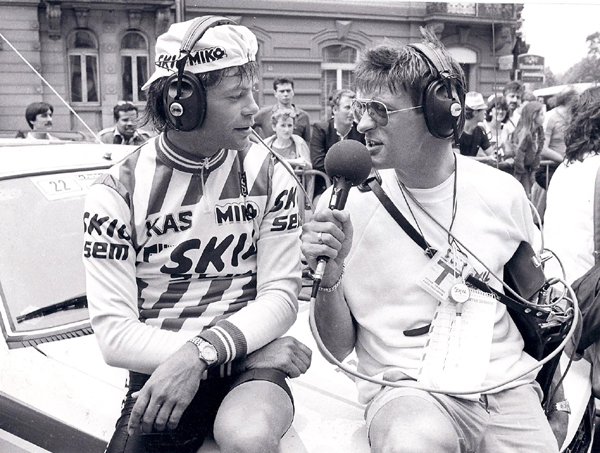
Jac van Meer (in Skill kit) being interviewed by Gerrie Knetemann at the 1985 Tour de France.
BM: Knetemann was on Skil too?
JvM: Yes, there were four Dutch riders on Skil [in 1985], Frits Pirard, Gerrie Knetemann, Jean Habets and me.
BM: You ended up on Skil with Sean Kelly?
JvM: I was with Sean Kelly.
Les Woodland: Did you ask them or did they ask you?
JvM: I went with Knetemann. Knetemann took me to them.
Les Woodland: Was that a condition of his going?
JvM: Yes.
BM: He said, "These are the guys I want to bring with me."?
JvM: Right.
BM: And so he brought you along?
JvM: Yes.
BM: Good guy.
JvM: Yes. A lot of people found him strange. But to me he was a good friend. He was always talking because he was from Amsterdam, and Amsterdam is not Holland [laughter] and in this part of Holland we are close to Belgium and the people are...
Les Woodland: More subdued...
JvM: Quite. And then they say, "That guy from Holland, with the big mouth"...they say he had a big mouth, but his heart was good.
Les Woodland: Very funny man.
JvM: Yes.
BM: So is that the year you rode the Giro and the Tour?
JvM: Yes, 1985.
BM: You must have been exhausted after riding two Grand Tours.
JvM: Yes. There is a funny story. We were to ride the Giro, the Dutch guys on the team, because [team director Jean] de Gribaldy didn't want the Dutch guys with the big mouths on his team for the Tour de France. So, let them ride in Italy and [he said] in the Tour de France I can take all the French riders.
BM: Who was your General Classification rider in the Giro? What were you at the Giro for?
JvM: At the Giro we were racing for stage wins. We had no man for the Classification, we went only for stage wins or to get a rider in a good break.
BM: Who won that year [1985]?
JvM: Bernard Hinault, the second and last time he won. That year he won both the Giro and the Tour.
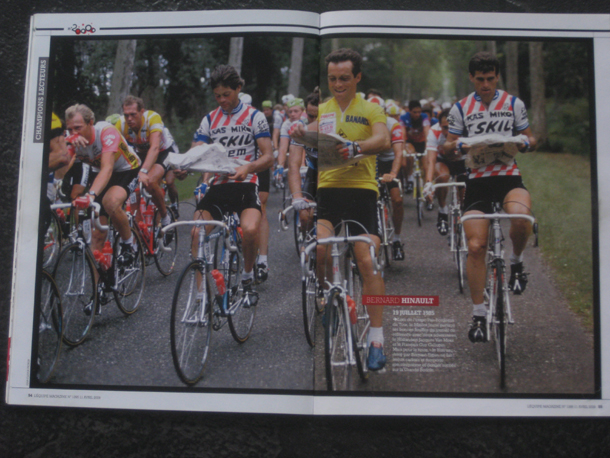
From L'Équipe magazine. Bernard Hinault shares the paper with van Meer (in Skil kit on left).
BM: For you, what was the difference between the Giro and the Tour?
JvM: For the riders, at that time, the Giro was much, much better. It was more relaxed. When you were finished with a stage, your hotel was within five or ten kilometers. And you started the next stage in the same town you finished the day before.
BM: Not so many transfers?
JvM: Yes. And the hotels were good. The food was good. The Tour de France? That was a different case.
BM: You had Félix Lévitan, the financial boss of the Tour, looking for pennies, doing all the transfers, trying to earn a profit by charging more cities to host a Tour stage finish or departure?
JvM: Yes. For the riders, at the Tour, the food was not so good, the hotels were not so good. At the Tour of Italy, you could choose what you wanted to eat at the end of a stage, in France, no.
BM: Back then, were you riding the stages "Giro Style", where the first three hours were piano, and then it would wind up to a fantastic speed in the final hour?
JvM: Yes. What was funny...when you were in the Giro, particularly in the south, in the first two or three hours you were not to ride very hard, because all the people who were standing by the side of the road wanted to see Moser. They wanted to see Visentini. They wanted to see Saronni. They threw flowers into the peloton.
BM: They wanted to see their heroes?
JvM: Yes, and they didn't want to see them at 60 miles an hour [van Meer claps his hand and makes motion of a rider meaning a rider going by quickly]. No, no...tranquillo, tranquillo.
BM: So the reason the Giro was ridden that way was partly because of marketing on the part of Italian teams, selling their products and their riders?
JvM: Yes. It was a different way of cycling.
Les Woodland: A friend of mine who won a stage in the Giro in the 1960s said that when he was away, by himself or in a small break, Italian spectators would willingly push him up the hill. But what they were really doing was tugging on his back brake cable, to put his brakes on. What were the Italian spectators like for you?
JvM: You know, I was not a competitor of Moser or Visentini. So, they said, let him him ride, that dead guy. But I remember the last stage of that Giro very well. It was a time trial, from Lido di Camaiore, on the Tuscan coast, to Lucca. It was 48 kilometers. You came to Lucca, an old city surrounded by a wall, a wall you can ride on.
BM: On top of the wall?
JvM: Yes. We rode three-quarters around the city on the wall and then into the city square for the finish. There were a lot of people there. At that point the difference in the classification between Moser and Hinault was only 35 or 45 or 50 seconds. And so in the last stage they tried to throw a bottle in front of Hinault’s front wheel, so that he might get a [claps to simulate a puncture]. And then perhaps Moser can win. That's the Italian people, the tifosi.
BM: Passionate?
JvM: Yes.
BM: I guess they don't ride the Giro piano style any more with the start of the Pro Tour and the arrival of all the northern European teams who don't ride the same way.
JvM: Yes. But I must say that in the Tour de France of '85, there were also some stages that in the first two or three hours, the speed was a little bit slower. Because Hinault wanted to win his fifth Tour. And everything, everything, he controlled. Because he was Bernard Hinault.
BM: He was really the boss?
JvM: When you were at the start and you want to try to get away, he would take you...[makes a motion of pulling back]
BM: He'd grab your jersey and pull you back?
JvM: Yes.
BM: He really was the boss?
JvM: He was. I think, after Hinault there was no one who was like that. Maybe Armstrong. I don't know, because I didn't ride with him.
BM: He just had the force of character that allowed him to do this?
JvM: Yes. He was not the best rider, but he won the Tour. The Tour should have been won by LeMond.
BM: So you come out of the Giro [van Meer finished the Giro 82nd, at 1hr 48min 43sec], how do you feel? Was this your first three-week race?
JvM: Yes, this was my first three-week race. I felt good, very good. The last week was better than the first week.
BM: You were a lucky guy, you were getting stronger?
JvM: I wasn't crashing, I wasn't getting sick. I came out of the Giro in very good condition. And then two weeks later came the national championship of Holland. I looked at the championship circuit and decided it was right for me. I think, that day, I was the best rider, but I was only third [Jacques Hanegraaf won].
And then the management of Skil, which was in Breda [Holland], told de Gribaldy that they want one Dutch rider in the Tour de France team. OK, that was me.
BM: So you rode for Sean Kelly in the Tour de France?
JvM: Three days before the Tour de France started I got a telephone call.
"Hey, Where are you?"
"I’m at home now, because I’m taking your telephone call."
"What are you doing?"
"I’m going fishing because I don’t have to do the Tour de France."
"No! Pack up your suitcase now. You’ll go to Brussels now and fly to Plumelec. You have to ride the Tour."
BM: But isn't that every rider’s dream?
Les Woodland: Nightmare...
JvM: I remember it all very well. I had to go to Jan Janssen [1968 Tour winner] to pick up a new Vitus frame, in my size, because Jan Janssen was then the importer of Vitus frames for Holland. I had to take it on the plane with me to Plumelec because the [Tour de France] team didn’t have a bike my size.
BM: So for the Tour there was only one bike your size?
JvM: Yes, the team prepared its bikes for the Tour and there were no bikes my size. So I took a frame that they would have to build up. I got to Plumelec and the first two days I was not on a bike because de Gribaldy had not agreed that I was to be there. He was not so lucky that the Dutchman with the big mouth was there. So he tried to put a stick in my wheel, because after two days my bike was not ready.
"The components are not here."
"Yeah!" [said in disbelieving, sarcastic tone]
BM: So you couldn’t keep your legs loose?
JvM: I could not ride and after the two days, I was totally blocked. I had done the three-week Giro and a lot of training and then I had to stop. So now not only my mind, but my body was saying, enough! You are coming to a period of rest. But then, I am in the circus of the Tour de France.
I was not welcome there. They didn’t see me as a friend. They saw me as an enemy.
BM: The other riders on the team were Frenchmen? Were they friendly?
JvM: Yes, the other riders were French and they were friendly.
BM: But de Gribaldy wasn't friendly.
JvM: But de Gribaldy...and there was one mechanic.... "Fucked-up Dutchman!"
So, after two days, I don't speak very good French, and I am with a guy who doesn't speak English.
BM: This is your roommate?
Les Woodland: Yes.
JvM: I went to Sean Kelly. I said, "Sean, listen. I am not here for myself. I am here for the team. And I'm here for you. You want to try to win a stage, you want to try to win the green jersey, you want to be in the first three in the classification? I want to help you. But not this way. Go to de Gribaldy, and I will go with you. We'll be in the same room. You speak English. We've got to do it. Otherwise I'll go home."
Sean Kelly went to de Gribaldy and then we went to the mechanic. And then I roomed with Kelly the rest of the Tour de France.
BM: And then your problems went away? And your body got used to riding again?
JvM: After three or four days it was good. I could do my work for Kelly. As I told you we were supporting him for the General Classification and he won the green jersey. I think we won two stages.
BM: And did that mean a good payday for you?
JvM: Hah! That's a good question. I will tell a story now that is not so nice. After the Tour de France, I thought to myself, "That was good." My contracts for the Dutch criteriums after the Tour were for more money. There are a lot of Dutch criteriums after the Tour de France. I could get twice the money because I did the Tour. I could ride 35 or 40 criteriums after the Tour. I had done the Tour of Italy, the Tour de France and 35 criteriums. That was good money.
The end of the story...the team split up. Sean Kelly went to Spain to KAS. He asked me, "Do you want to come with me to KAS?"
But I was also offered a very good contract with Knetemann to ride for Skil for two years. That was for a team in Holland.
BM: So you'd be home?
JvM: Home. So I said I would not go to Spain to ride for KAS, I will stay in Holland. But then at the end of the year, Skil said, "We have agreements, but we cannot continue the team." But we had already signed. It was worth nothing. No team. So, in the end, there was a little pro team, Skala. Skil merged with Skala; the two teams came together with 22 riders.
1986 was not a good year. I don't think I recovered from 1985. I had to travel a lot. We had to go to the judge because Skil wanted to stop. We had to push Skil to continue for one year, with less money. So, there was a lot of trouble and the year started badly. At the end of '86, I stopped.
BM: You retired?
JvM: Yes. And now I have this story about de Gribaldy. Typical. So after the Tour de France, we had some money coming from the team.
BM: The prizes?
JvM: The bonuses for the riders are paid by the national federation. The Tour de France paid the money to the Dutch riders' association, and they were to pay me. But the team bonuses, I must get from de Gribaldy. But de Gribaldy didn't pay me. And he didn't pay Knetemann, who in 1985 won the Amstel Gold Race. He would pay all that money, he said, at the end of the year.
And he didn't pay.
BM: De Gribaldy?
JvM: De Gribaldy. He didn't pay. And that year he owed me about 20,000 guilders. That should be now, about 8,000 euros (11,000 USD).
BM: Real money?
JvM: Real money. That was more than twenty years ago. He wanted to start a team in Spain with KAS, as a manager/director. There was Mr. Hein Verbruggen, a Dutchman who was just starting with the UCI. We wrote a letter to Verbruggen saying that de Gribaldy gets a license, but he doesn't pay us. He owes us money.
"Oh," says Verbruggen, "I'll make a phone call to de Gribady. I will arrange a meeting in Brussels. And de Gribaldy must come."
Verbruggen told him that he must pay the four guys their money. If he didn't, he'll get no license. Verbruggen told him that he had to come to Brussels on the 8th of January to pay us in cash.
On the 2nd of January de Gribaldy gets in an accident and dies. Killed!
No money!
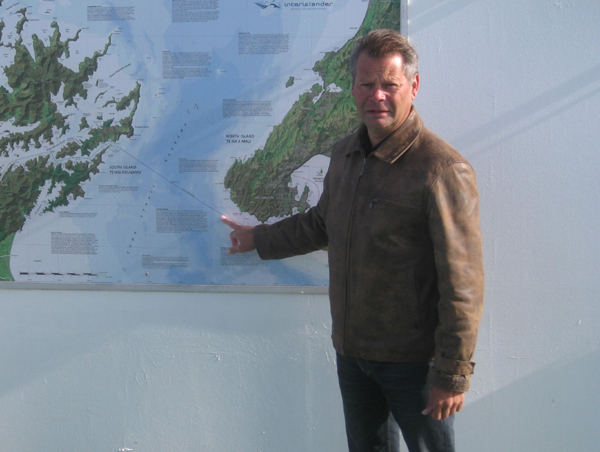
Jac van Meer in 2011 while visiting New Zealand.
BM: Normally the guy who wins the yellow jersey wins money from the Tour de France organization but he doesn't keep the prize money, he gives it to his team. Is this also true for the green jersey?
JvM: Yes.
BM: So Sean Kelly split his winnings with you?
JvM: Yes. He gave his bonus to us. He said, "They worked well for me in the Tour and I get to keep the green jersey, but that bonus goes to the riders."
BM: Just like Fausto Coppi?
JvM: He did that?
BM: They say he was the first one to split his race winnings with the team, because he was going to make plenty of money by being the winner of the Tour de France or the Tour of Italy. Louison Bobet is often given credit for making such a bargain with his team in the 1953, but he was following Coppi who was doing this in the late 1940s. I think without that, the poor guys on Coppi's team would have very little. [I should have shut up and let Jac talk...]
JvM: As far as I know, all the riders who win a jersey give the bonus to the riders on the team, and not only the riders, the mechanics get something as well.
Les Woodland: How did you do in the Classics?
JvM: In Amstel Gold, I was in the top ten..[8th in 1984]...Henninger Turm, Liège–Bastogne–Liège...Always very cold, bad weather...
BM: Did you ride any of the cobbled classics?
JvM: I did the Tour of Flanders, but there are not as many cobbles as in Paris–Roubaix.
BM: Hard?
JvM: Yeah, it was hard. I rode it in 1985. That year the weather was so, so, so very bad. Eric Vanderaerden won. Sean Kelly was in front. It was so cold I didn't do the last kilometers and since I knew Kelly was in the front group, it was good.
BM: He's there and you've done your job...
JvM: I had done my job, but he didn't win [Kelly finished 16th]. Three days after the race he gave me an envelope. He said "I couldn’t win because there were some circumstances, but you did your work well. Here, have some money."
He didn't sell the race. Understand. When you feel you cannot win but you can earn some money...OK, take it.
BM: He couldn't win, but he could get others who don't know this to pay him and thus, get some money for you?
JvM: Right, he did not sell the race. That is why there are stories about buying big races. You don't buy a big race. You don't sell a big race. When it is clear to you, you are 100 percent sure that you cannot win, yet there is somebody who wants to win...
BM: Blackmail?
JvM: No. You say, "Let us make an agreement."
Les Woodland: You just help somebody else.
JvM: That is not buying and selling, that is doing business.
Les Woodland: How much did Belgian riders ride against you, a Dutchman, say, in the Tour of Flanders?
JvM: The Belgian riders were more concerned about the other Belgian riders than about the Dutch riders.
BM: They wanted to be the first Belgian?
JvM: Yes. There is always a race in the race. Who is the first Belgian? That’s not only true of big races. I told you about all the criteriums. In 1980 Joop Zoetemelk won the Tour de France. Cycling boomed in Holland. Everybody wanted to ride. They also wanted to visit the small criteriums after the Tour de France. One and a half weeks after the finish of the Tour de France was the Acht van Chaam.
BM: Sorry?
Les Woodland: Chaam is the town and it's called "acht", the number "eight", because the course crosses over itself.
BM: I get it, a figure eight.
JvM: 1968, the year Jan Janssen won the Tour, there were about 70,000 people to see the riders from the Tour de France. And when Zoetemelk won the Tour, there were about 60,000 people there.
BM: A very big deal?
JvM: Yes, from 1980 to the '90s there were so many criteriums in Holland after the Tour de France. They were held every day, in the south, in the north, in the middle, in the west, the east. The riders got good money.
Les Woodland: How much is the result decided in advance?
JvM: In the criteriums? In the big races, Classics, Tour de France, you don't buy those. After that, the criteriums are for the people, they are a show for the fans to see the jerseys from the Tour de France, the World Champion. You can do two things. You can go every day and fight each other. Or you say, the people are coming for the green jersey, the yellow jersey, so the green jersey is in the front.
Les Woodland: To show themselves?
JvM: Yes. If after the Tour de France you go for thirty days and every day you ride a criterium, and if you fight hard every day [he makes a gesture of slicing his throat]...
BM: It's just too much?
JvM: So they ride fast. But I know my place. I get my prime to start and when it is in this area, I will show myself at the front. But when the race is at Limburg...
BM: Let the riders from Limburg show themselves and be the local heroes?
JvM: Yes. And those men in the pictures with the yellow jersey and green jersey...
BM: So they can see their heroes?
JvM: Yes. First of all. There is a difference between Dutch criteriums and Belgian Kermesses. In Holland, after the Tour de France, there is a manager, a total manager. He gives you a contract and you a contract and you a contract.
BM: This is in Holland?
JvM: Holland. The organizer says I want that man and I want that man and that man. He gets 500 euros and he gets 1,000 euros, he gets 2,000 or 3,000 euros. You are invited to ride and you get some money for it. In Belgium there are a lot of races. If I have a license, I go to a race, pay 10 euros...
Les Woodland: You pay to ride?
JvM: You give the organizer a little money and you can race.
BM: So you don’t need a contract to ride a criterium in Belgium?
JvM: You are not invited, you just go by yourself. There are also criteriums in Belgium where they invite you. There are so many races that if you are not invited, you can go someplace else and ride.
They call it a Kermis [usually spelled in English as kermesse]
Les Woodland: Kermis, it's a fair, from the days when they were held with a village fair.
JvM: It’s a three or four day village fair, with something for the children, and an amateur or pro race.
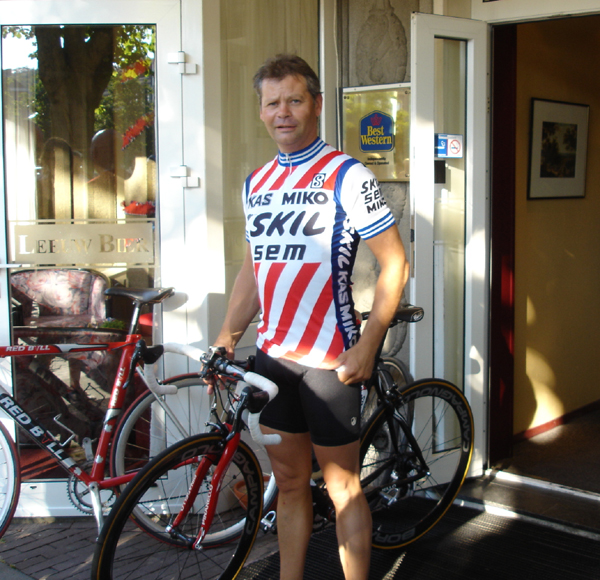
Van Meer hasn't hung up the bike, he still keeps fit.
Les Woodland: Freddy Maertens won a great many criteriums. We're going to see him. You said you were on the same team?
JvM: Yes.
Les Woodland: What was Maertens like to ride for? What sort of man was he?
JvM: Freddy Maertens...You know the stories?
Les Woodland: You said to me once, he a bit special.
JvM: Freddy was one of the best riders...ever. He won 54 races in one year.
Les Woodland: What was he like?
JvM: Freddy...A very good rider, a strong rider, a very good sprinter. In the Tour of Spain, he won eight or ten stages in one year.
BM: But that was a Vuelta made for him wasn't it?
JvM: Yes.
Les Woodland: But as a man, what's he like, his personality?
JvM: Very nice guy.
BM: You like him?
JvM: He's too good for this world.
Les Woodland: Really?
JvM: Yes.
BM: Is that why he was always in trouble? There are people who are too gentle to be among wolves.
JvM: Yes.
Les Woodland: In what way too good?
JvM: Freddy had Lomme Driessens [Maerten's director at Flandria during Maerten’s best years]. He was always with Lomme, who arranged everything for him. What time he'd go to bed, what time he'd get up, when he would train, what he would eat. When that happens, you are dependent upon one person. Freddy was just eating, drinking, training, racing. Nothing else. He was winning a lot of races and there were a lot of people around him. And they saw the money.
BM: And there was a lot...
JvM: There was a lot of money. He was a very good rider. So they said, "Hey Freddy, do business with me."
And he’d say, "Yes."
"Hey Freddy, do business with me." And Freddy would say yes.
BM: And he trusted them? Because he was honest he trusted people?
JvM: Yes. And when the money was gone, they said...
BM: Good-bye?
JvM: Yes.
BM: But the Belgian tax man still wanted taxes on all that money that had disappeared?
JvM: Yes. He had to pay taxes on money he never got. When Freddy had an accident and broke his wrist...
BM: On the Mugello speedway in the 1977 Giro, he ran into Rik Van Linden...
JvM: Yes, It didn't heal right and he had some problems with his health, and then the people who were around him all the time, taking care of him, were gone.
BM: He couldn't take care of himself?
JvM: Yes. He fell into a big, deep...
Les Woodland: Depression?
JvM: ...black gap. But then Lomme [Driessens] returned and Freddy had a second career. He became Champion of the World and won five stages in the Tour de France. And then after that...
BM: He fell off again.
JvM: Yes. And everybody left him. And then in 1984, one of the last years of his career, he was in the same small Dutch team that I was riding for, AVP-Viditel.
BM: He was in the twilight of his career, unable to find the rhythm?
JvM: He couldn’t find the rhythm. The people who were always around him were gone.
BM: Because the money wasn't there?
JvM: Yes.
Les Woodland: How is he now?
JvM: He's good. His health is really good. And that's my story.
Les Woodland: For me, that fills in big gaps. I couldn't understand why a man that successful could have so many problems, then do nothing, then be at the top, then fall so quickly. You've explained it all.
BM: I've got one last question that I ask every professional now: Was it fun? Did you enjoy it? Was it worthwhile? Would you do it over again?
JvM: If I were offered the possibility of doing it all over again, I would not hesitate even one second. Yes, I would do it again. I'll bet a lot of people have already said that to you. And, I had known then what I know now, I'd still start again.
BM: When you see racing on TV, do you wish you were there now?
JvM: No. I've learned a lot from my time in the cycling world, how to manage some things, and how not to manage some things. If you know what you can't do, you know what you can do.


